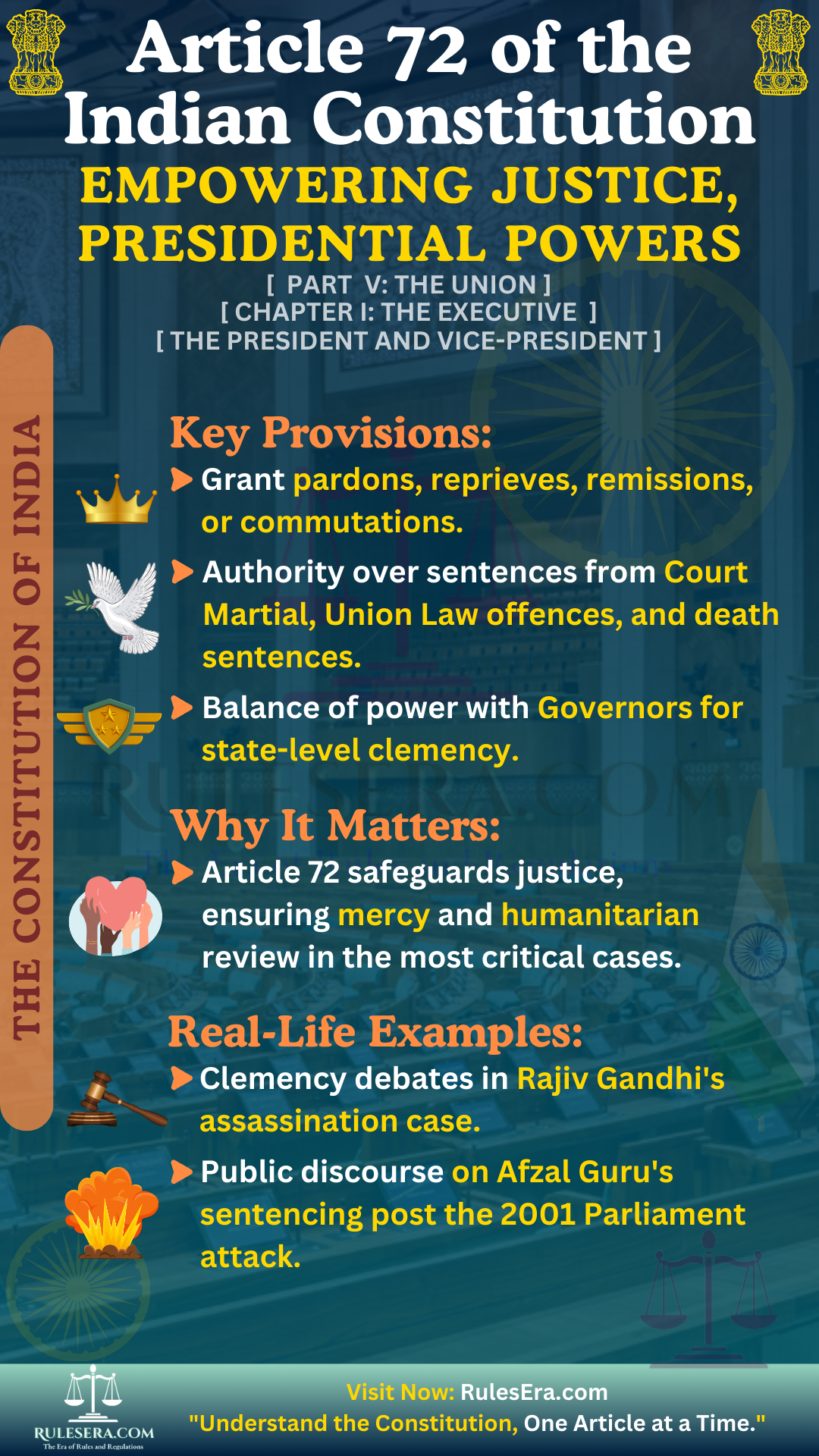Part V: The Union
Chapter I: The Executive
Article 72: Power of President to Grant Pardons, etc., and to Suspend, Remit or Commute Sentences in Certain Cases

--- Original Article ---
(1) The President shall have the power to grant pardons, reprieves, respites or remissions of punishment or to suspend, remit or commute the sentence of any person convicted of any offence—
- (a) in all cases where the punishment or sentence is by a Court Martial;
- (b) in all cases where the punishment or sentence is for an offence against any law relating to a matter to which the executive power of the Union extends;
- (c) in all cases where the sentence is a sentence of death.
(2) Nothing in sub-clause (a) of clause (1) shall affect the power conferred by law on any officer of the Armed Forces of the Union to suspend, remit or commute a sentence passed by a Court Martial.
(3) Nothing in sub-clause (c) of clause (1) shall affect the power to suspend, remit or commute a sentence of death exercisable by the Governor of a State under any law for the time being in force.
Explanation
Article 72 of the Constitution of India empowers the President of India with the extraordinary authority to grant pardons, reprieves, respites, or remissions of punishment, as well as to suspend, remit, or commute sentences of any person convicted of an offence. This power is crucial in ensuring justice, particularly in cases where legal procedures have been exhausted but circumstances demand executive intervention, such as cases of extreme public sentiment or humanitarian concerns.
Clause (1): President’s Power to Grant Pardons, Reprieves, Remissions
Sub-clause (a): In Cases by Court Martial - The President has the authority to intervene in cases where a sentence is passed by a Court Martial, which deals with offences committed by members of the armed forces.
Sub-clause (b): Offences Relating to Union Laws - The President's power extends to offences under laws that fall within the Union’s executive authority, ensuring that crimes that impact the nation’s security or integrity can be addressed through executive discretion.
Sub-clause (c): Death Sentence - One of the most significant powers under Article 72 is the ability to pardon or commute death sentences. This aspect of the President's authority offers an additional layer of protection for individuals sentenced to capital punishment, allowing for humanitarian review.
Clause (2): Armed Forces and Court Martial
This clause clarifies that the powers conferred on officers of the Armed Forces to suspend, remit, or commute sentences passed by Court Martial remain unaffected by the President’s powers under sub-clause (a). Thus, military justice retains its autonomous authority within its framework, with the President's power acting as an additional, but not exclusive, remedy.
Clause (3): Governor’s Power to Grant Relief in Death Sentences
Although the President holds the authority to pardon or commute death sentences, this clause ensures that the Governor of a State also retains the power to suspend, remit, or commute death sentences under applicable state laws. This provision maintains a balance of powers between the Union and the States, giving State executives autonomy in certain legal matters.
Amendments:
No significant amendments have been made to Article 72. However, its interpretation has evolved through landmark judicial rulings that clarify the scope of the President’s clemency powers.
Real-life Examples:
One of the most notable cases is the clemency granted to Rajiv Gandhi’s assassins. Despite their conviction and death sentence, multiple petitions were filed seeking the President’s pardon. The delays and legal complexities surrounding the case highlighted the importance of Article 72 as a tool for ensuring justice in sensitive cases.
In the case of Afzal Guru, convicted for his role in the 2001 Parliament attack, there was intense public and political debate surrounding his execution. Numerous petitions seeking clemency were submitted to the President. This case highlighted the significant impact of Article 72, illustrating the delicate balance between justice and mercy in capital punishment cases.
Historical Context:
The power to grant pardons and reprieves is a legacy of British constitutional practices, where the monarch held similar powers. In the Indian context, Article 72 was incorporated to ensure that justice is tempered with mercy, reflecting the values of a democratic and humane society. This provision serves as a critical check on the judiciary’s sentencing powers, ensuring that the executive can intervene in cases of injustice or harsh penalties.
Legislative History:
Article 72 of the Indian Constitution was initially drafted as Article 59, deliberated on 29th November 1948 and 17th October 1949.
Debates and Deliberations:
In the Constituent Assembly debates, Mr. Tajamul Husain proposed deleting clause (3) of Article 59, arguing that the power to suspend, remit, or commute death sentences should be vested exclusively in the President of India. He contended that, as the supreme Head of State, the President should hold the ultimate authority to grant pardons, particularly for federal offenses, to ensure a strong and unified central government. Husain cautioned against allowing State rulers or Provincial Governments to exercise such powers, as it could undermine federal authority and foster divided loyalties.
Opposing Husain's proposal, Shri R. K. Sidhwa argued that Governors, being closer to local conditions, should retain their clemency powers. He noted that Governors' decisions could be monitored by state legislatures, ensuring accountability. Sidhwa also pointed out that in a federal structure, it was practical for Governors to handle such matters initially, with the President serving as the ultimate authority if required.
Following these discussions, Husain’s proposed amendment was rejected, and the existing provision was retained in the Indian Constitution.